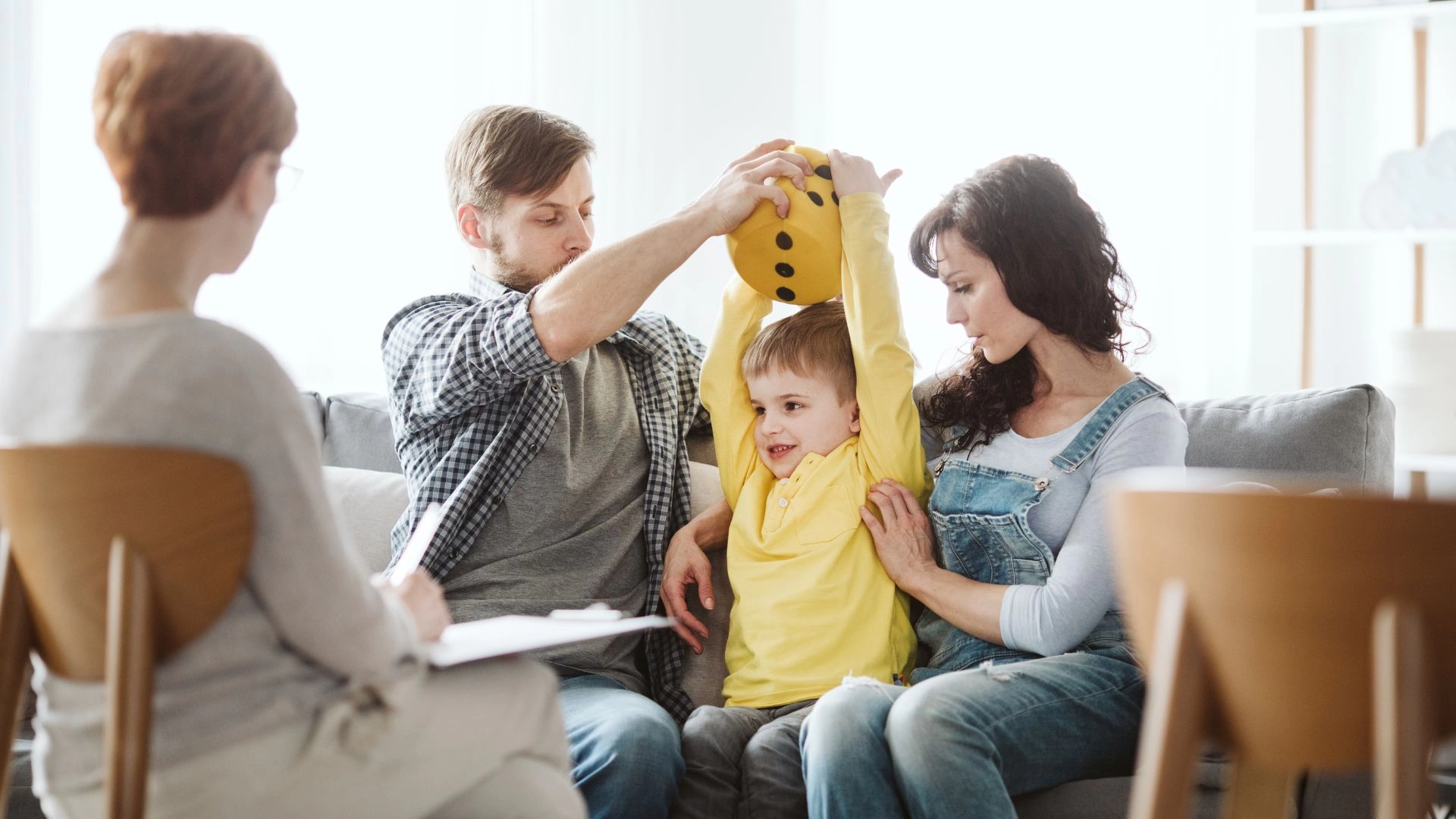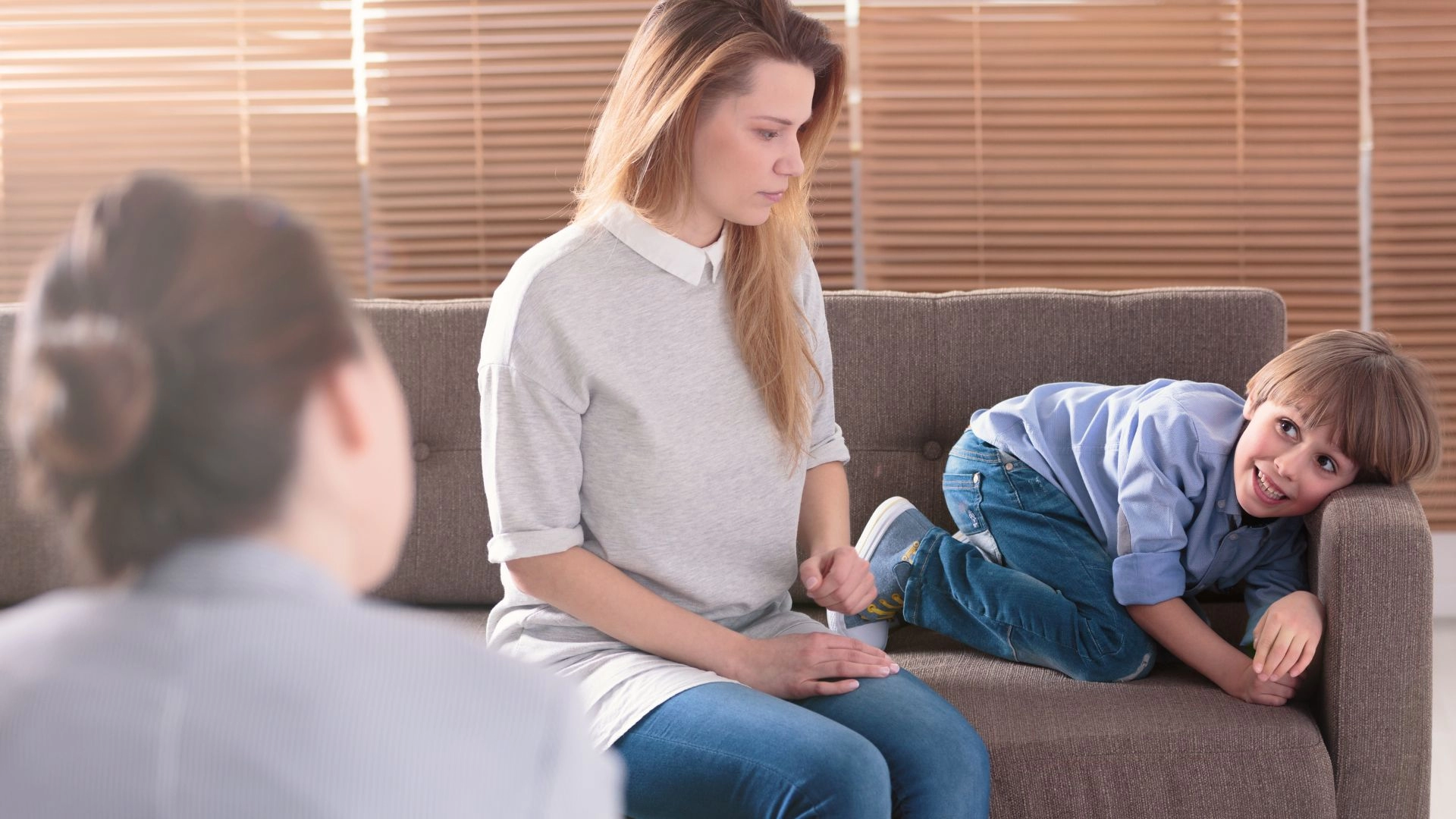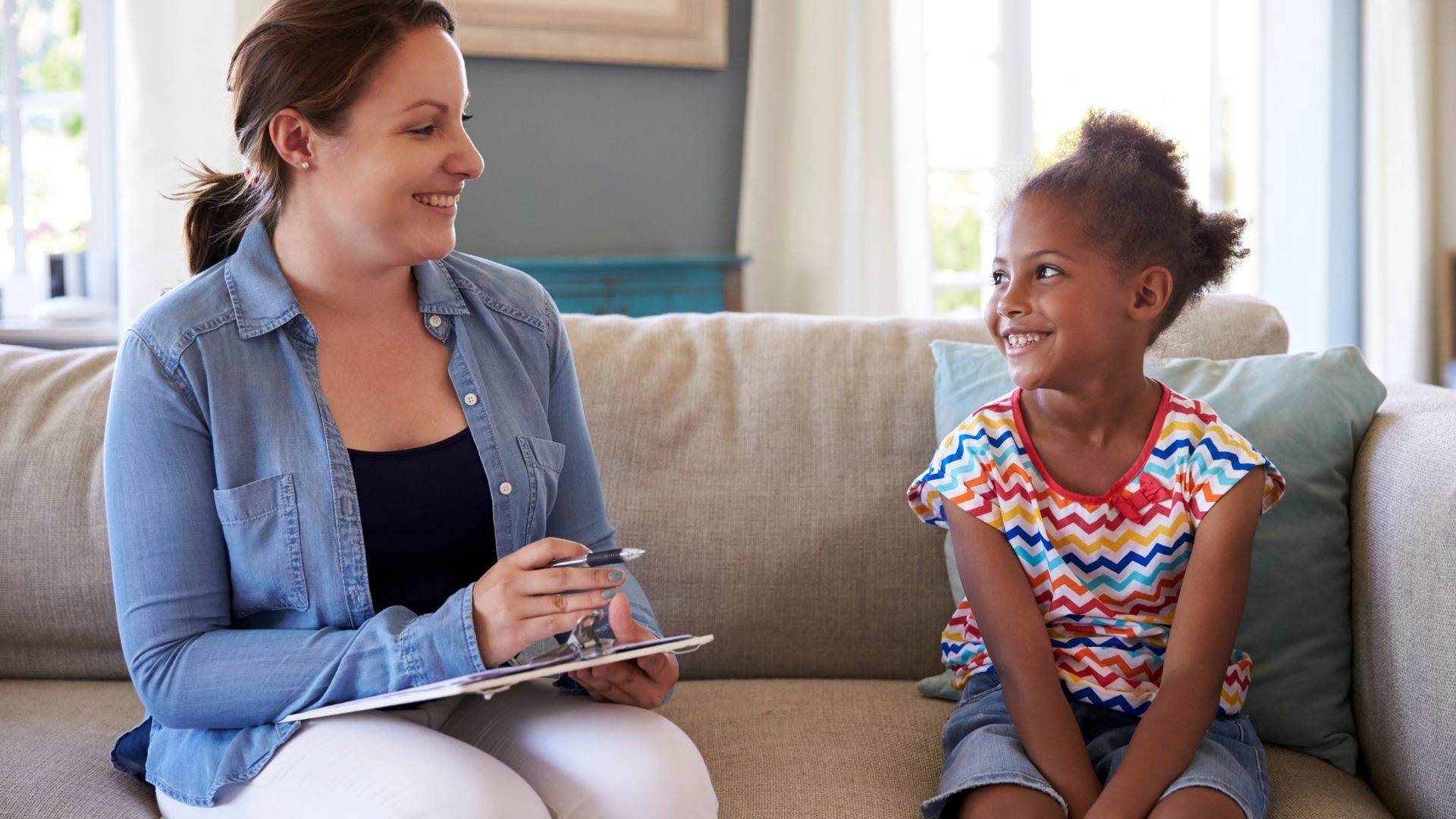Child Counseling Therapy for ADHD in Mississauga
We recognize that dealing with ADHD can be challenging for children and their families in Mississauga. Child Counseling Therapy provides a compassionate space where kids can learn effective coping mechanisms tailored to their needs. Through approaches like cognitive-behavioral therapy and play therapy, children can modify negative behaviors while building emotional regulation skills. Our focus is on creating a supportive environment that empowers both children and parents. Together, we can strengthen relationships and enhance understanding of ADHD. If you’re interested, there’s more to explore about how these therapies can support your child’s journey.

About Child Counselling Therapy
Child counseling therapy offers a compassionate space where we grasp and address the unique challenges faced by children with ADHD. It’s essential for us to recognize that ADHD in children can greatly impact their emotional regulation and overall well-being. Through child mental health services, we provide tailored ADHD treatment options designed to support each child’s needs.
In our sessions, we often employ behavioral therapy and cognitive-behavioral therapy techniques. These approaches help children learn valuable skills for managing their emotions and behaviors. We focus on child behavior modification strategies that empower kids to make positive changes in their daily lives.
Additionally, we realize that many children may also experience anxiety, so we offer therapy for kids with anxiety, ensuring a holistic approach to their mental health. Our goal is to create a safe, nurturing environment where children can express themselves freely and develop coping strategies. With the right ADHD support, we watch as children gain confidence and improve their ability to navigate challenges. Together, we’re committed to fostering resilience and promoting healthy development in our children, guiding them toward a brighter future.
ADHD Symptoms, Diagnosis, and Their Impact on Childhood Development
Understanding the symptoms of ADHD is important, as they not only affect a child’s ability to focus and learn but also influence their emotional and social development. ADHD symptoms can manifest as attention problems, impulsivity, and hyperactivity, which can lead to behavioral disorders in children. When we recognize these signs early, we can pursue an ADHD diagnosis through an ADHD evaluation, which is essential for effective child development.
The impact of ADHD on a child’s emotional well-being can be significant. Children may struggle with self-esteem, face challenges in peer relationships, and experience frustration in academic settings. It’s important to address these issues, as they can hinder their overall growth and development.
Fortunately, there are various ADHD treatment options available, including behavioral therapies and coping mechanisms for ADHD that help children manage their symptoms. By implementing effective ADHD management strategies, we can support our children in overcoming challenges and thriving in their environments. Together, we can foster a supportive atmosphere that promotes understanding and acceptance, helping our children navigate their journey with ADHD while encouraging their potential for success.
The Role of Child Counseling in Managing ADHD
Maneuvering the challenges of ADHD can be overwhelming for both children and their families, making child counseling an invaluable resource in managing these symptoms and fostering emotional resilience. Through ADHD therapy, we can help our kids learn effective coping mechanisms that address their unique struggles. Child counseling provides a safe space where children can express their feelings and develop significant skills.
Behavioral therapy for kids focuses on modifying negative behaviors and reinforcing positive ones, using various child therapy techniques tailored to individual needs. Parents also play a vital role, which is why parent training for ADHD can be beneficial. We can learn effective ADHD strategies that not only support our children but also empower us as caregivers.
Joining ADHD support groups can further enhance our understanding and provide a sense of community. These connections remind us that we’re not alone in this journey. Together, we can explore different aspects of ADHD counseling, ensuring our children receive the support they need. By leveraging these resources, we can help our kids thrive and navigate their lives with greater success and confidence.

Cognitive Behavioral Therapy (CBT) as a Treatment for ADHD
Cognitive Behavioral Therapy (CBT) offers a structured approach that helps children with ADHD develop practical skills to manage their symptoms and improve their daily functioning. In our experience, this type of child counseling therapy focuses on identifying negative thought patterns and transforming them into positive behaviors. By doing so, we empower our children to tackle the ADHD challenges they face.
Through CBT, we provide emotional support for children, teaching them ADHD coping skills that can be applied in various situations. This therapy for ADHD in children emphasizes the importance of behavioral intervention, allowing kids to understand the links between their thoughts, feelings, and actions. As a result, they learn to navigate their child behavior disorders more effectively.
Moreover, CBT can also address therapy for childhood anxiety, which often coexists with ADHD. By fostering resilience, we can help children develop strategies to cope with their emotional responses. In our sessions, we create a safe space where children feel supported, enabling them to practice these skills. Ultimately, our goal is to equip them with the tools they need for a more fulfilling life, paving the way for success both at home and in school.
Play Therapy: A Creative Approach for Children with ADHD
Building on the foundational skills learned in Cognitive Behavioral Therapy, play therapy offers a creative and engaging way for children with ADHD to express themselves and work through their emotions. In our sessions, we’ve found that play therapy acts as a bridge, allowing children to navigate their feelings and experiences in a safe environment. This therapeutic intervention is particularly effective for emotional regulation in children, as it encourages them to explore their thoughts through games and imaginative play.
As child therapists, we incorporate ADHD-friendly activities that cater to each child’s unique interests. These activities not only capture their attention but also promote child mental wellness by fostering a sense of accomplishment and self-esteem. Through play, we can address ADHD behavior management in a non-threatening way, helping children learn coping strategies and problem-solving skills.
Ultimately, play therapy provides a nurturing space where children with ADHD can thrive. By engaging in this creative approach, we empower them to better understand their emotions and develop essential life skills, paving the way for a brighter future. Together, we can support their journey towards emotional growth and resilience.
School Counseling and Academic Support for Children with ADHD
Maneuvering the school environment can be particularly challenging for children with ADHD, but with the right counseling and academic support, we can help them thrive academically and socially. School counseling plays an essential role in addressing focus issues that many kids with ADHD face. By collaborating with educators, we can develop ADHD accommodations tailored to each child’s needs.
One effective tool is the Individualized Education Plan (IEP for ADHD), which outlines specific strategies and resources. This plan guarantees that our children receive the academic support they need to succeed. Through child counseling therapy, we can empower children to advocate for themselves, enhancing their confidence and school performance.
Additionally, we should utilize ADHD resources available within our schools and communities. These resources provide crucial information and support for both parents and educators, helping us create a nurturing environment. By fostering open communication between parents, teachers, and counselors, we can develop a robust support system that encourages our children to overcome challenges and excel in their educational journey. Together, we can make a significant difference in the lives of children with ADHD, enabling them to reach their full potential.
Enhancing Parent-Child Relationships Through Therapy for ADHD
Strengthening the bond between parents and children with ADHD is essential, as therapy can provide valuable tools and strategies for fostering understanding and communication within the family. Through child counseling therapy, we can learn effective ADHD parenting tips that specifically address our unique challenges. Parent-child therapy allows us to engage in meaningful conversations, nurturing emotional development and enhancing ADHD and social skills.
As we navigate this journey, we can embrace therapeutic play, which not only makes learning enjoyable for our children but also builds their resilience. Therapy for special needs children often includes techniques that support both parents and kids, helping us understand each other’s perspectives. This collaborative approach can transform our interactions, leading to more positive outcomes.
Moreover, when we seek therapy for troubled youth, we’re investing in our children’s futures. By participating in child resilience therapy, we can equip our family with the tools needed to face challenges head-on. Ultimately, strengthening our connection with our children through therapy creates a supportive environment, empowering them to thrive despite ADHD. Together, we can enhance our relationships and foster a nurturing home for our children to flourish.

Emotional Support for Children Coping with ADHD
Emotional support is essential for children coping with ADHD, as it helps them navigate their feelings and build resilience in the face of challenges. In our journey through child counseling therapy, we focus on emotional healing for children, recognizing that ADHD-related anxiety can greatly impact their well-being. By employing ADHD therapy techniques tailored to each child, we cultivate a supportive environment that encourages expression and understanding.
Child-focused therapy allows us to address the unique emotional needs of school-aged children, fostering a sense of safety and trust. Here, we promote parent-child therapy, empowering parents to play an active role in their child’s emotional support system. We help families develop effective communication strategies that enhance emotional connections.
In addition, we emphasize stress management for children, equipping them with ADHD self-care strategies they can use in their daily lives. By creating coping mechanisms tailored to their needs, we enable children to face challenges with confidence. Ultimately, our goal is to guarantee that every child feels understood and supported, helping them thrive despite the hurdles ADHD may present. Together, we work towards fostering emotional resilience and a brighter future for our children.
Behavioral Therapy for Addressing ADHD in Kids and Adolescents
As we continue our exploration of support strategies for children with ADHD, behavioral therapy emerges as a powerful approach in helping kids and adolescents manage their symptoms effectively. This form of child counseling therapy focuses on modifying specific behaviors associated with attention deficit hyperactivity disorder (ADHD), such as impulsivity and hyperactivity.
In child therapy sessions, we work collaboratively with parents and caregivers to develop strategies that promote positive behavior changes. Child behavioral therapy often includes techniques like reinforcement, which encourages desirable behaviors while discouraging those that are problematic. Furthermore, these sessions can help improve executive function skills, enabling children to plan, organize, and complete tasks more efficiently.
ADHD coaching is another valuable component, providing kids with the tools and skills they need to navigate daily challenges. By setting achievable goals and maintaining a structured environment, we foster a sense of accomplishment and self-esteem. Through consistent practice, children learn to manage their symptoms better, ultimately leading to more fulfilling and productive lives. Behavioral therapy not only addresses the symptoms of ADHD but also empowers children to thrive in their personal and academic lives.
Group Therapy: Helping Children Overcome ADHD Challenges Together
Group therapy offers a unique opportunity for children with ADHD to connect with peers facing similar challenges, fostering a sense of belonging and shared understanding. In these supportive therapy for children sessions, we work together under the guidance of an ADHD specialist, focusing on ADHD education and practical strategies to manage symptoms.
As we share our experiences, we learn that we’re not alone in dealing with ADHD and emotional dysregulation. This collective approach enables us to explore childhood emotional issues openly, validating each other’s feelings and coping mechanisms. We can practice mindfulness for kids, helping us to develop essential skills for self-regulation and emotional clarity.
Through engaging activities and discussions, we build resilience and strengthen our social skills, which are vital for maneuvering everyday situations. Group therapy for kids allows us to celebrate our successes and support one another during setbacks, creating a safe environment for growth. With pediatric counseling, we gain tools to face challenges together, empowering us to thrive both individually and collectively. Ultimately, this experience not only enhances our understanding of ADHD but also reinforces our sense of community and friendship.
Family Therapy for Effective ADHD Management at Home
While group therapy helps us build connections, family therapy provides an essential framework for managing ADHD effectively at home, ensuring that everyone is on the same page and working together toward common goals. By engaging in family therapy, we can better understand our child’s ADHD diagnosis process and the challenges they face daily. This approach not only enhances our parenting support but also strengthens our family bonds.
Through child and family counseling, we learn valuable strategies for ADHD and organization, which can be vital for creating a structured home environment. We can explore effective communication techniques, enabling us to address our child’s needs more effectively. Additionally, family therapy can guide us in collaborating with school support for ADHD, ensuring our child’s educational journey is as smooth as possible.
In moments of crisis, family therapy also provides tools for crisis intervention for children, equipping us to handle difficult situations with confidence. Participating in child therapy programs together can foster a sense of unity, reminding us that we’re all in this together. Ultimately, by embracing family therapy, we can create a supportive atmosphere that empowers our child to thrive.
Art Therapy as a Therapeutic Tool for Children with ADHD
Art therapy offers a creative outlet for children with ADHD, allowing them to express their emotions and thoughts in a safe and engaging way. By incorporating art therapy for kids into child counseling therapy, we can provide an effective tool that addresses the unique challenges associated with this neurodevelopmental disorder.
Art serves as a bridge to communication, especially when ADHD and impulsivity make traditional verbal expression difficult. Through various child therapy activities, children can explore their feelings and experiences, which can be particularly beneficial for those dealing with therapy for childhood trauma. This child-centered therapy fosters a sense of safety, enabling kids to create without fear of judgment.
Engaging in early intervention therapy through art not only enhances emotional regulation but also helps children build focus and patience. As they create, they can learn to manage the impulsivity often linked with ADHD, finding joy in their self-expression.
Ultimately, art therapy can be a powerful form of psychological therapy for children, providing them with essential coping strategies and a deeper understanding of their emotions. Together, we can support these young individuals on their journey to emotional well-being.
Grief Counseling for Families Facing ADHD-Related Difficulties
Steering through the complexities of ADHD can often lead to feelings of loss and grief for families, as we grapple with unmet expectations and the challenges that come with raising a child with this disorder. It’s important to recognize these feelings and understand that grief counseling for families facing ADHD-related difficulties can provide vital support.
Engaging in grief counseling for children and families helps us process emotions tied to the struggles we face. Through family support therapy, we can foster understanding and connection, allowing us to share our experiences and feelings in a safe environment. Child psychotherapy can also address underlying issues like anxiety and depression, providing targeted child anxiety treatment and child depression therapy.
Trauma-informed therapy is significant, especially for children who’ve faced challenges related to ADHD. It helps us create a nurturing space for healing and growth. Parent-child therapy can strengthen our relationships, enabling us to support our children as they navigate their emotions.
Mindfulness and Stress Management Techniques for Children with ADHD
Mindfulness and stress management techniques can be powerful tools for helping children with ADHD find balance and calm in their daily lives. By incorporating these practices into our child counseling therapy sessions, we can support our kids in managing impulsive behavior and reducing anxiety in children. Mindfulness encourages them to focus on the present moment, which can greatly improve their mental health.
We can introduce simple techniques like deep breathing exercises, guided imagery, or mindful walking to help our children develop awareness of their thoughts and feelings. These methods not only promote relaxation but also teach valuable time management strategies, allowing them to prioritize tasks more effectively.
In addition, we can explore stress management techniques tailored to their unique needs, ensuring they feel supported in handling daily challenges. As we engage in therapy for teens, we must emphasize that these tools are not just for coping during difficult moments but also for enhancing their overall well-being. By fostering mindfulness and stress management skills, we empower our children to handle life’s ups and downs with resilience, ultimately benefiting their mental health in kids and setting a foundation for a brighter future.
Connect with Our Child Counselling Therapy Center for ADHD Support in Mississauga
As we begin effective strategies for managing ADHD, we invite you to connect with our Child Counseling Therapy Center in Mississauga, where compassionate support awaits. Our team is dedicated to helping children navigate the challenges of ADHD through tailored child counseling therapy that addresses individual needs.
At our Child Counselling Therapy Center in Mississauga, we provide specialized counseling for children that focuses on improving attention and managing hyperactive behavior. Understanding that each child is unique, we use play-based therapy to engage them in a way that feels natural and enjoyable. This approach not only enhances learning but also creates a comforting and safe environment for your child.
For families seeking ADHD testing, we offer comprehensive assessments to guide our therapeutic strategies and support. We also emphasize ADHD lifestyle adjustments that can significantly improve daily functioning. Our child and adolescent counseling sessions integrate effective techniques, including trauma therapy, to address any coexisting issues alongside ADHD.
Together, we can create a positive, nurturing environment for your child. Contact us today to begin the journey toward better understanding and managing ADHD with expert guidance and support.

About City of Mississauga
Located in the heart of the Greater Toronto Area, Mississauga is a vibrant city that offers a diverse community and a wealth of resources for families seeking support for their children’s mental health needs. We recognize that maneuvering through ADHD can be challenging, especially for parents of hyperactive children. Fortunately, Mississauga is equipped with various options for child counseling therapy, including specialized programs for ADHD and its comorbidities.
As we explore these resources, we find that many local clinics provide adolescent counseling, focusing on ADHD awareness and tailored strategies. This includes ADHD mindfulness techniques and child social skills therapy, which help children develop essential coping mechanisms and improve their interactions with peers.
Moreover, we can access information about ADHD medication options and their potential impact on learning difficulties, ensuring we make informed decisions for our children. Together, we can foster a supportive environment that nurtures our children’s growth, helping them thrive despite their challenges. In Mississauga, we’re not alone; our community is here to support us in promoting mental well-being for our children facing ADHD.

- Port Credit
- Streetsville
- East Credit
- Malton
- Mineola
- Lisgar
- Applewood Hills
- Lorne Park
- Meadowvale
- Clarkson
- Cooksville
- Rockwood Village
- Meadowvale West
- Churchill Meadows
- Erin Mills
- Erindale
- Lakeview
- Dixie
- Sheridan Park
- L5H
- L5W
- L5V
- L5T
- L5S
- L5R
- L5P
- L5N
- L5M
- L5L
- L5K
- L5J
- L4T
- L5G
- L5E
- L5C
- L5B
- L5A
- L4Z
- L4Y
- L4X
- L4W
- L4V
Frequently Asked Questions
What Are the Costs Associated With Child Counseling Therapy for ADHD?
When we consider the costs associated with child counseling therapy for ADHD, it’s important to recognize that expenses can vary widely. We might encounter fees for initial assessments, ongoing sessions, and any supplementary resources. Many factors, such as the therapist’s experience and location, influence these costs. While it can feel overwhelming, we’re here to support each other in finding the most suitable options that fit our budget and our child’s needs.
How Can I Find a Qualified Child Counselor in Mississauga?
Finding a qualified child counselor can feel overwhelming, but we’ve got some helpful tips. First, we can ask for recommendations from friends, family, or pediatricians. Online directories and local mental health organizations are great resources too. Let’s also check reviews and credentials to verify they specialize in children’s needs. It’s important we trust our instincts, so scheduling a consultation can help us gauge if they’re the right fit for our child.
What Age Is Appropriate to Start Counseling for ADHD?
When it comes to starting counseling for ADHD, we believe that there’s no one-size-fits-all answer. Typically, children as young as five can benefit from therapy, especially if they’re struggling with social skills or emotional regulation. The earlier we address these challenges, the better. However, it’s crucial to take into account each child’s unique needs and circumstances, as some might thrive better in a supportive environment a bit later. We’re here to help navigate this journey together.
Are There Support Groups for Parents of Children With ADHD?
Absolutely, there are support groups for parents of children with ADHD. We recognize how challenging it can be to navigate this journey alone, and connecting with others who share similar experiences can be incredibly beneficial. These groups offer a safe space to share concerns, exchange tips, and find encouragement. It’s comforting to know we’re not alone and can learn from each other as we support our children together.
How Long Does Child Counseling Therapy for ADHD Typically Last?
When we think about how long child counseling therapy for ADHD typically lasts, it can vary quite a bit. Generally, we might expect therapy to last several months, often ranging from 12 to 20 sessions. However, it’s important to remember that every child’s needs are unique, and some may require more or less time. We’re here to support each other through this journey, focusing on growth and understanding along the way.
